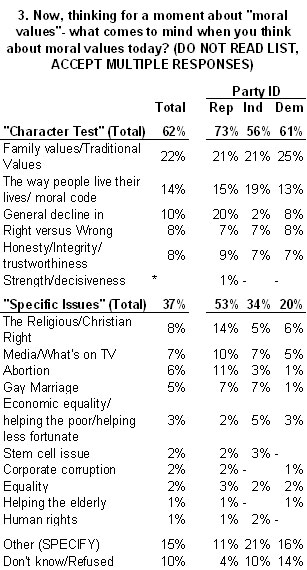Today, the National Journal’s Hotline released their latest Westhill Partners/Hotline Poll. Two things of note there for MP’s readers: First, though the Hotline’s daily news summaries are available only through a pricey subscription, National Journal is making the complete Westhill/Hotline poll available online free of charge. Second, the most recent poll (complete results here, Powerpoint summary here), includes a genuinely interesting finding regarding the “moral values”
I’ll let the front page commentary from Hotline Editor Chuck Todd explain:
This month’s edition of the Westhill/Hotline poll tries to give folks a better understanding of what “moral values” are in the minds of voters and which party represents which values.
— In an open-ended question, when asked to define “moral values,” 62% of the responses were character tests, while just 37% of the responses named a specific issue (be it gay marriage, abortion or corporate corruption).
Just to be clear, here is the question with responses sorted into the two categories Todd described (and also crosstabulated by party identification):

Two minor notes: First, the question allowed for multiple responses, so the percentages in the table add up to more than 100%. Second, the subtotals (37% and 62%) sum all mentions, so they may may double count some respondents.
Some may quibble with the way the Hotline categorized these responses, but the main point is the division between those responses that clearly referenced public policy issues and those that were more vague. The implication: For many voters — Democrat and Republican — “moral values” may have as much to do with perceptions of the candidate’s character as with their stands on specific issues. For many, as Chuck Todd put it in an email, “moral values” in the context of politics means mostly “don’t act like Bill Clinton in office.”
Mark,
Slightly off topic– Quite a bit of disconnect, wouldn’t you say, in the Westhill numbers on the favorability of Congress compared to other recent polling.
For a similar analysis, see this Pew report from last November:
http://people-press.org/reports/display.php3?ReportID=233
Key passage:
The survey asked voters who were given the list of issues to describe, in their own words, “what comes to mind when you think about ‘moral values’?” Among voters who chose moral values as most important from the list of seven issues, about half gave a response that mentioned a specific issue. More than four-in-ten (44%) defined the phrase specifically in terms of social issues, including abortion (28%) homosexuality and gay marriage (29%), or stem cell research (4%). A few other issues also were mentioned, including poverty, economic inequality, and the like.
But the definition of moral values is not limited to policy references. Nearly a quarter of respondents (23%) who cited moral values as important explained their thinking in terms of the personal characteristics of the candidates, including honesty and integrity (cited by 9%). Almost one-in-five (18%) explicitly mentioned religion, Christianity, God, or the Bible. Another 17% answered in terms of traditional values, using such language as “family values,” “right and wrong,” or “the way people live their lives.”
People who did not choose moral values from the list of issues were also asked what the term meant to them. The pattern of responses was quite different from those who said moral values were an important consideration. Fewer mentioned a specific issue, candidate quality, or general religious theme; more answered in general terms, and 12% explicitly protested the imposition of others’ values on them, said the idea was being used as a “wedge” against Democrats, or otherwise expressed a negative reaction to the phrase.
Gerry asked:
“Slightly off topic– Quite a bit of disconnect, wouldn’t you say, in the Westhill numbers on the favorability of Congress compared to other recent polling.”
Westhill Hotline asks respondents if they have a “favorable or unfavorable opinion” of the “U.S. Congress.” In this poll, 51% were favorable, 33% unfavorable.
Gerry’s point (I assume) is that ratings by other pollsters tend to be more negative. See this compilation by the Polling Report:
http://www.pollingreport.com/job.htm
Note that other pollsters ask a different question, usually some variant of: “Do you approve or disapprove of the way the U.S. Congress is handling its job?”
I’m assuming that the focus on the phrase “handling/doing it’s job” explains much of the difference. Your guess is as good as mine as to why, but a wild guess is that some respondents answer the Westhill question thinking about the institution or even the Capitol Building rather than the politicians that work there.